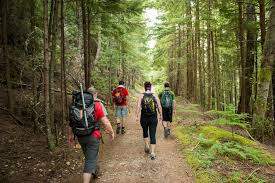记忆方法
1. high + walk => hike.
2. high + bike => hike.
3. bike => hike.
2. high + bike => hike.
3. bike => hike.
中文词源
hike 远足,徒步旅行,(价格,数量等)增加,上升
来自英语方言hyke,精神抖擞的走路,可能来自中古英语icchen,猛拉,晃动,词源同hitch.引申词义远足,徒步旅行,特指山路上的徒步。词义增加,上升来自hitch变体。
英语词源
- hike (v.)
- 1809, hyke "to walk vigorously," an English dialectal word of unknown origin. A yike from 1736 answers to the sense.
HIKE, v. to go away. It is generally used in a contemptuous sense. Ex. "Come, hike," i.e. take yourself off; begone. [Rev. Robert Forby, "The Vocabulary of East Anglia," London, 1830]
Sense of "pull up" (as pants) first recorded 1873 in American English, and may be a variant of hitch; extended sense of "raise" (as wages) is 1867. Related: Hiked; hiking. The noun is from 1865.
权威例句
- 1. They went on a ten-mile hike through the forest.
- 他们做了一次穿越森林的十英里徒步旅行。
- 2. After the hike to the river the soldiers camped for the night.
- 士兵们步行到达那条河后露营过夜.
- 3. The boys have gone on a long hike with the Boy Scouts.
- 男孩们已经随童子军长途徒步旅行去了.
- 4. My shirt will hike up if I don't wear a belt.
- 如果我不扎腰带,衬衣就向上滑.
- 5. It's a hell of a hike from Sydney to Perth.
- 从悉尼到珀斯的徒步旅行简直苦死了.
